International Toy Fair Nuremberg 2009
Internationale Spielwarenmesse Nürnberg 2009
| x |
|
|
|
|
|
|
|
|
|
|
|
|
|
|
|
|
|
|
|
|
|
|
|
|
|
|
|
|
|
|
|
|
|
|
|
|
|
|
|
|
|
|
|
|
|
|
|
|
|
|
| Eggertspiele / Hutter Trade |
|
|
|
|
|
|
|
|
|
|
|
|
|
|
|
|
| x |
|
|
|
|
|
|
|
|
|
|
|
|
|
|
|
|
|
|
|
|
|
|
|
|
|
|
|
|
|
|
|
|
|
|
|
|
|
|
|
|
|
|
|
|
|
|
|
|
|
|
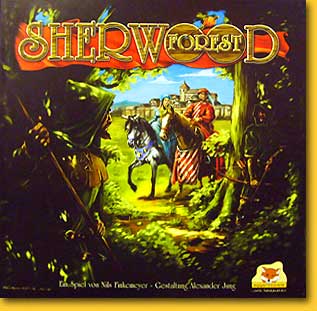 |
Score fame points for robberies with your gang, alone or with the aid of companions. Try to outwit the other players by talking them into a robbery, while you know this place will be visited by the sheriff!
The game lastst six rounds; each round consisting of two phases: a planning phase where the robbers are placed on the board, and a robbery phase where the loot cards are scored for points that possibly will lead to victory.
At the start of a round, five loot cards are laid out, one of them open that is known to all players. |
|
| x |
|
|
|
|
|
|
|
|
|
|
|
|
|
|
|
|
|
|
|
|
|
|
|
|
|
|
|
|
|
|
|
|
|
|
|
|
|
|
|
|
|
|
|
|
|
|
|
|
|
|
In the planning phase, each player takes one of the following actions:
- gather information in the pub: one robber is put there and the player may look into one of the blind loot cards;
- get equipment: place one robber on the trader, pay one gold and put it on the location of the gold mine and take a robber card;
- hire a new gang member: place one robber on the market and pay two gold into the gold mine;
- wait in a hide out for a hold up, being the heart of the game.
When choosing the last action, a player occupies a hide out. Additionally he has the opportunity to come to an agreement with one or the other player. When going into an unoccupied hide out, this makes one of the placed robbers there the chief. To be able to receive the loot, the hold up must equal or exceed the strength of the travellers.
Each traveller has a strength from 1 to 14 points, with increasing value of the loot consisting of gold, new companions or fame points. The strength of the robbers is their sum totalled with played equipment cards.
When a player has decided he will go into a hide out and make a robbery, he could try to talk other players into a pact. This could be because he does not have enough strength by himself for the robbery . He asks for additional strength or cards; other players can accept the proposal but the loot is no subject - this will be shared equally in the coming robbery phase. |
|
| x |
|
|
|
|
|
|
|
|
|
|
|
|
|
|
|
|
|
|
|
|
|
|
|
|
|
|
|
|
|
|
|
|
|
|
|
|
|
|
|
|
|
|
|
|
|
|
|
|
|
|
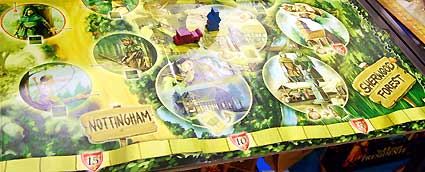 |
|
| x |
|
|
|
|
|
|
|
|
|
|
|
|
|
|
|
|
|
|
|
|
|
|
|
|
|
|
|
|
|
|
|
|
|
|
|
|
|
|
|
|
|
|
|
|
|
|
|
|
|
|
In the robbery phase players choose one of the travel cards next to the game board. The coach is moved according to the information on the travel card. All occupied hide outs it passes are checked if there will be a robbery. At the moment of a robbery, players decide if and in which order they would like to add equipment cards from their hand. If there is a pact between players, they must play the earlier promised cards.
When the strength of the robbery is equal to or exceeds the strength of the travellers, the robbery must take place, even if it was not the intended one from the planning phase. The loot is shared, and the robber go back to the players supply. If the robbery was not succesful, the coach continues its way and the robbers in the hide out wait for a next opportunity. |
|
| x |
|
|
|
|
|
|
|
|
|
|
|
|
|
|
|
|
|
|
|
|
|
|
|
|
|
|
|
|
|
|
|
|
|
|
|
|
|
|
|
|
|
|
|
|
|
|
|
|
|
|
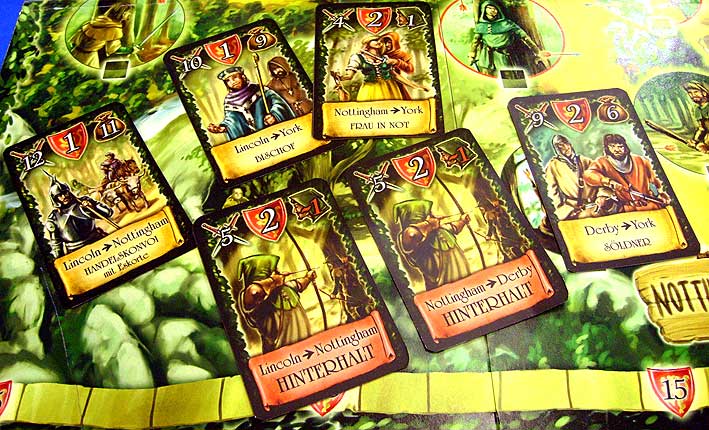 |
| x |
|
|
|
|
|
|
|
|
|
|
|
|
|
|
|
|
|
|
|
|
|
|
|
|
|
|
|
|
|
|
|
|
|
|
|
|
|
|
|
|
|
|
|
|
|
|
|
|
|
|
A round ends when all travel cards have been played. The game ends after the sixth round.
In the advanced game, the sheriff and special equipment cards come into play. The negotiation phase is somewhat different as now there can be a planned and an unplanned robbery. In a planned robbery the chief may freely divide the loot between his companions if the robbery was for a travel card that was not the same as the one that players made their pact for; otherwise the chief must share the loot according to what was agreed on.
The sheriff cards are treated like normal travel cards when the strength of the robber in a hide out is equal or stronger than that of the sheriff card; there obviously is no loot, but in this case fame points are awarded. When the strength of a robber is less than that of the sheriff, all players in the hide out suffer from the results printed on the sheriff card, which means a loss of one or more robbers.
Special equipment cards include food, a forest vest or messenger robe, each with varying effects.
It is wise to have many robbers on the market place, and to get information of what travel cards are going to be played in a round. Players should take part in as many robberies as possible, even smaller ones, as they all give fame points.
Sherwood Forest, Nils Finkemeyer, Eggertspiele / Hutter Trade, 2009 - 3 to 6 players, 9 years and up, 60 minutes |
|
| x |
|
|
|
|
|
|
|
|
|
|
|
|
|
|
|
|
|
|
|
|
|
|
|
|
|
|
|
|
|
|
|
|
|
|
|
|
|
|
|
|
|
|
|
|
|
|
|
|
|
|
| x |
|
|
|
|
|
|
|
|
|
|
|
|
|
|
|
|
|
|
|
|
|
|
|
|
|
|
|
|
|
|
|
|
|
|
|
|
|
|
|
|
|
|
|
|
|
|
|
|
|
|
| x |
|
|
|
|
|
|
|
|
|
|
|
|
|
|
|
|
|
|
|
|
|
|
|
|
|
|
|
|
|
|
|
|
|
|
|
|
|
|
|
|
|
|
|
|
|
|
|
|
|
|
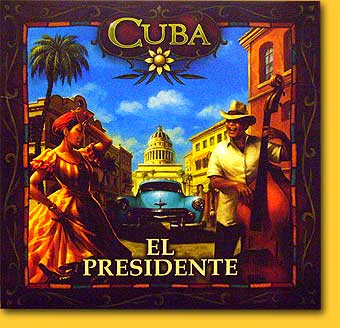 |
The expansion to be used by 'Cuba'. An additional game board, more and different ship cards, laws, buildings, new character cards to be used with the other characters, and a whole new phenomenon: Cuba - the Arrival of the President!
In their turn, players may take and play a character from the 'El Presidente' board: the worker, dancer, attorney, warden, revolutionist or musician. They all have different effects.
The worker acts as a warehouse; all your goods are safe this turn. The revolutionist gives you one victoy point, the musician two money. The player with the dancer card becomes start player. |
|
| x |
|
|
|
|
|
|
|
|
|
|
|
|
|
|
|
|
|
|
|
|
|
|
|
|
|
|
|
|
|
|
|
|
|
|
|
|
|
|
|
|
|
|
|
|
|
|
|
|
|
|
| With the attorney a player may use a building even when his supervisor is not on the row or column of this building. The warden may change two adjacent ships in position. There is a mule card that is used when playing with less than four players; this card cannot be chosen. When all players have chosen a card, the car of the president moves to the position of the remaining card; remember, there are five cards that each turn are shuffled and randomly placed in the window of this board. |
|
| x |
|
|
|
|
|
|
|
|
|
|
|
|
|
|
|
|
|
|
|
|
|
|
|
|
|
|
|
|
|
|
|
|
|
|
|
|
|
|
|
|
|
|
|
|
|
|
|
|
|
|
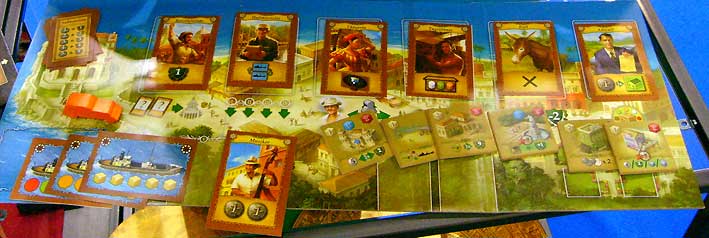 |
| x |
|
|
|
|
|
|
|
|
|
|
|
|
|
|
|
|
|
|
|
|
|
|
|
|
|
|
|
|
|
|
|
|
|
|
|
|
|
|
|
|
|
|
|
|
|
|
|
|
|
|
| Under each card on the board are symbols that come into effect when the car of the president stops here. The first makes all law proposals go into effect; the second makes it possile to move the supervisor anywhere on a player board. Or the next round makes it possible to pay one money and overbuild a building with another; the difference in cost must be paid as well. Or it could be that the leading player goes back two points on the score track, or at the market wares can be bought at discount prices. Players now must not only consider of which role they would like to take, but also which position they likely want to be visited by the president - and which not. |
|
| x |
|
|
|
|
|
|
|
|
|
|
|
|
|
|
|
|
|
|
|
|
|
|
|
|
|
|
|
|
|
|
|
|
|
|
|
|
|
|
|
|
|
|
|
|
|
|
|
|
|
|
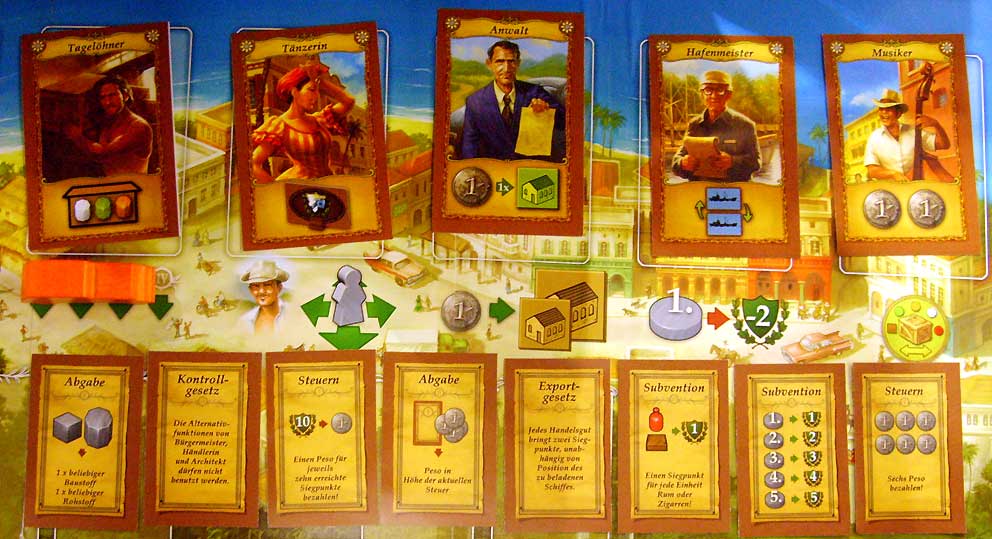 |
| x |
|
|
|
|
|
|
|
|
|
|
|
|
|
|
|
|
|
|
|
|
|
|
|
|
|
|
|
|
|
|
|
|
|
|
|
|
|
|
|
|
|
|
|
|
|
|
|
|
|
|
| The new laws can be used in conjunction with the old ones, or used as a new set. |
|
| x |
|
|
|
|
|
|
|
|
|
|
|
|
|
|
|
|
|
|
|
|
|
|
|
|
|
|
|
|
|
|
|
|
|
|
|
|
|
|
|
|
|
|
|
|
|
|
|
|
|
|
 |
| x |
|
|
|
|
|
|
|
|
|
|
|
|
|
|
|
|
|
|
|
|
|
|
|
|
|
|
|
|
|
|
|
|
|
|
|
|
|
|
|
|
|
|
|
|
|
|
|
|
|
|
The game now lastst 8 rounds instead of just 6.
Cuba - El Presidente, Michael Rieneck & Stefan Stadler, Eggertspiele / Hutter Trade, 2009 - 2 to 5 players, 12 years and up, 90-150 minutes |
|
| x |
|
|
|
|
|
|
|
|
|
|
|
|
|
|
|
|
|
|
|
|
|
|
|
|
|
|
|
|
|
|
|
|
|
|
|
|
|
|
|
|
|
|
|
|
|
|
|
|
|
|
| x |
|
|
|
|
|
|
|
|
|
|
|
|
|
|
|
|
|
|
|
|
|
|
|
|
|
|
|
|
|
|
|
|
|
|
|
|
|
|
|
|
|
|
|
|
|
|
|
|
|
|
| x |
|
|
|
|
|
|
|
|
|
|
|
|
|
|
|
|
|
|
|
|
|
|
|
|
|
|
|
|
|
|
|
|
|
|
|
|
|
|
|
|
|
|
|
|
|
|
|
|
|
|
 |
|
|
|
|
|
|
|
|
|
|
|
|
|
|
|
|
|
|
|
|
|
|
|
|
|
|
|
|
|
|
|
|
|
|
|
|
|
|
|
|
|
 |
|
|
|
|
|
|
|
|
|
|
|
|
|
|
|
|
|
|
|
|
|
|
|
|
|
|
|
|
|
|
|
|
|
|
|
|
|
|
|
|
|
 |
|
|
|
|
|
|
|
|
|
|
|
|
|
|
|
|
|
|
|
|
|
|
|
|
|
|
|
|
|
|
|
|
|
|
|
|
|
|
|
|
|
|
|
 |
|
|
|
|
|
|
|
|
|
|
|
|
|
|
|
|
|
|
|
|
|
|
|
|
|
|
|
|
|
|
|
|
|
|
|
|
|
|
|
|
|
 |
|
|
|
|
|
|
|
|
|
|
|
|
|
|
|
|
|
|
|
|
|
|
|
|
|
|
|
|
|
|
|
|
|
|
|
|
|
|
|
|
|
| x |
|
|
|
|
|
|
|
|
|
|
|
|
|
|
|
|
|
|
|
|
|
|
|
|
|
|
|
|
|
|
|
|
|
|
|
|
|
|
|
|
|
|
|
|
|
|
|
|
|
|
| x |
|
|
|
|
|
|
|
|
|
|
|
|
|
|
|
|
|
|
|
|
|
|
|
|
|
|
|
|
|
|
|
|
|
|
|
|
|
|
|
|
|
|
|
|
|
|
|
|
|
|
 |
|
|
|
|
|
|
|
|
|
|
|
|
|
|
|
|
|
|
|
|
|
|
|
|
|
|
|
|
|
|
|
|
|
|
|
|
|
|
|
|
|
|
|
|
|
|
|
|
|
|
|
|
|
|
|
|
|
|
|
|
|
|
|
|
|
|
|
|
|
|
|
|
|
|
|
|
|
|
|
|
|
|
|
|
|
|
|
|
|
|
|
|
|
|
|
|
|
|
|
|
|
|
|
|
|
|
|
|
|
|
|
|
|
|
|
|
|
|
|
|
|
|
|
|
|
|
|
|
|
|
|
|
|
|
|
|
|
|
|
|